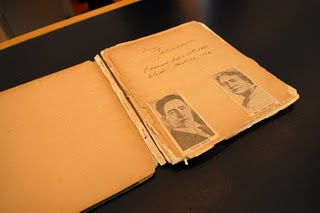
A new chapter in the saga of Chester Gillette and Grace Brown was opened on Tuesday, March 6 with the donation of Chester's diary to Hamilton College's Burke Library by a descendant of Chester's.
The diary was written during the last six and a half months of Chester's life while he was in Auburn Prison awaiting execution by electric chair and ever since after the execution in 1908, the diary was in the possession of the family of Chester's sister, Hazel Gillette McWade (1887-1975)for generations before it was passed down to Hazel's granddaughter, Marlynn McWade-Murray of Tallahassee, Florida. After conducting an Internet search for her great-uncle and realizing the importance of the diary, she got in touch with Craig Brandon, author of "Murder in the Adirondacks" and "Grace Brown's Love Letters." Craig then put her in touch with Randall Ericson, the librarian at Hamilton College and they agreed that the diary should be donated to the library's vast Gillette collection that included District Attorney George Ward's court documents, old newspaper clippings and of course, Grace's love letters.
In the diary, we are introduce to a very different Chester as opposed to the Chester we know from previous historical accounts. The Chester in the diary is more mature, more spiritual and more concerned for his family's future after his death. This was a far cry from the Chester Gillette that was portrayed in the trial transcript, the press, and history.
In short, the diary is the story of Chester's redemption.
As I sat in the audience listening to the presentation and listening to the passages read from the diary, including his last entry that was written just minutes before he was led to the electric chair, I too was surprised by the new interpretation of Chester. It made me step back and reevaluate what I have learned about him during the year and a half that I have been involved with the story of Chester and Grace.
The only things that the diary does not contain is a confession that many expected Chester to write, nor does it offer an account of what happened to Grace at Big Moose Lake on July 11, 1906. However, he does mention Grace only once in a passage where he admitted that he was never in love with her. Other than that, the diary is more about his transition from boy to man as he waited for his death.
I did meet Marlynn before I left the presentation. She is a very nice person and I saw a little bit of her grandmother in her. From what I have learned about her grandmother, who was 19 at the time of the murder in 1906, she was a really strong young woman considering what she had to deal with. And while my heart is still with Grace, Hazel was someone to be admired.
And so was Chester.





